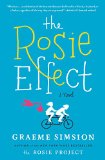Summary | Excerpt | Reading Guide | Reviews | Beyond the Book | Read-Alikes | Genres & Themes | Author Bio

This article relates to The Rosie Effect
The star of Graeme Simsion's The Rosie Effect, Don Tillman, is a unique character to say the least. His awkwardness in social settings, his overly logical and mathematical mind, his knack for offending people with blunt truths, and his tendency to obsess over the details of Rosie's pregnancy all combine to create a charming and unwittingly entertaining protagonist. While it isn't explicitly discussed in the book, Don shows clear signs of Asperger syndrome (AS), a high-functioning form of autism that was first described by Dr. Hans Asperger, an Austrian pediatrician, in 1944.
According to the National Institute of Neurological Disorders and Stroke (NINDS), Asperger syndrome is "an autism spectrum disorder (ASD), one of a distinct group of complex neurodevelopment disorders characterized by social impairment, communication difficulties, and restrictive, repetitive, and stereotyped patterns of behavior...The social communication deficits in highly functioning persons with Asperger syndrome include lack of normal back-and-forth conversation; typical eye contact, body language, and facial expression; and trouble maintaining relationships. Fixated interests and behaviors include repetitive use of objects or phrases, stereotyped movements, and excessive attachment to routines, objects or interests."
One of the world's leading autism science and advocacy organizations, Autism Speaks, explains that, for people with Asperger's, "motor development may be delayed, leading to clumsiness or uncoordinated motor movements. Compared with those affected by other forms of ASD [autism spectrum disorders], however, those with Asperger syndrome do not have significant delays or difficulties in language or cognitive development. Some even demonstrate precocious vocabulary – often in a highly specialized field of interest."
The cause of Asperger syndrome is not known, though researchers suspect there may be a genetic component, as it tends to run in families and among twins. (In The Rosie Effect, Don's father is a blunt, no-nonsense kind of guy, and his awkwardness hints at the source of Don's Asperger's.) The official diagnosis of AS is a relatively recent thing; in 1992 it was included in the World Health Organization's diagnostic manual, the International Classification of Diseases, and in 1994 it was officially recognized by the American Psychiatric Association and included in the DSM-IV. Prior to that, many people with AS went undiagnosed.
In a fascinating article in The New Yorker, Pulitzer Prize-winner Tim Page explains how he spent the majority of his life searching for answers. Why, when he could memorize encyclopedias of information, was he always in the bottom of the class in school? Why didn't others appreciate his level of detail? Why did he feel so restless and isolated? It wasn't until 2000 when he was finally diagnosed with Asperger's that things seemed to make sense. "Here, finally, was an objective explanation for some of my strengths and weaknesses, the simultaneous capacity for unbroken work and all-encompassing recall, linked inextricably to a driven, uncomfortable personality."
So how is Asperger's diagnosed? It's not so easy. There isn't a standardized way of testing for the syndrome, in part because there's no singular checklist of symptoms. People with AS might demonstrate a number of combinations of traits, so diagnosis generally includes testing for a broad spectrum of common symptoms. Children with Asperger's are usually diagnosed between the ages of 7 and 9, though symptoms may be present within the first year of life. Babies with AS tend to miss developmental milestones, such as standing or crawling, and they might avoid eye contact, attention or affection. Repetitive behaviors, such as rocking, and delays in social development, e.g. the failure to smile or respond to moms' and dads' voices, become more apparent as the baby ages. Interestingly, language development is not delayed in children with Asperger's. On the contrary, their first words tend to be more complicated than the basic "mama" or "dada." Advanced words like "mountain" or "sheetrock" might be more common.
While there is no known cure for Asperger syndrome - and some question whether there is a need for a cure at all - and no single best method of treatment, early intervention can help reduce the difficulties caused by AS and can teach helpful coping mechanisms sooner. Cognitive behavioral therapy, social skills training, speech or physical therapy, medication for co-existing anxiety or depression, and family support training can be very useful in helping people with Asperger syndrome integrate into mainstream society.
Many highly accomplished and gifted people have come forward to tell their stories of living with Asperger syndrome including John Elder Robinson, author of the New York Times bestseller Look Me in the Eye: My Life with Asperger's, and Temple Grandin, animal scientist and author of the highly acclaimed The Autistic Brain: Thinking Across the Spectrum, which was made into a TV movie starring Claire Danes. Their stories have helped raise awareness about the realities of AS and the many gifts people with Asperger syndrome possess.
Filed under Medicine, Science and Tech
![]() This "beyond the book article" relates to The Rosie Effect. It originally ran in January 2015 and has been updated for the
July 2015 paperback edition.
Go to magazine.
This "beyond the book article" relates to The Rosie Effect. It originally ran in January 2015 and has been updated for the
July 2015 paperback edition.
Go to magazine.
Your guide toexceptional books
BookBrowse seeks out and recommends the best in contemporary fiction and nonfiction—books that not only engage and entertain but also deepen our understanding of ourselves and the world around us.